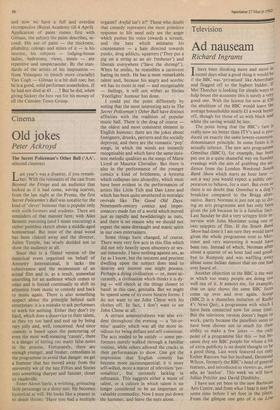Cinema
Old jokes
Peter Ackroyd
y ast year's was a disaster, if you remem- ber. With the remnants of the cast from Beyond the Fringe and an audience that looked as if it had come, waving scarves, from the last night at the Proms, the first Secret Policeman's Ball was notable for the kind of 'clever' humour that is popular only with sixth-formers and students. There are reminders of that manner here, with Alan Bennett executing (and I mean executing) a rather pointless sketch about a middle-aged homosexual. But most of the dead wood has been cleared away and the director, Julien Temple, has wisely decided not to show the audience at all.
Since this is a filmed version of- the theatrical event organised on behalf of Amnesty International, it lacks the cohesiveness • and the momentum of an actual film and is, as a result, somewhat unsettling for an audience which comes to relax and is forced continually to shift its attention from music to comedy and back to music again. There is also something suspect about the principle behind such enterprises: it is a mistake to ask performers to work for nothing. Either they don't try hard, which does a disservice to their talent, or they try too hard and end up by being very jolly and, well, concerned. And since comedy is based upon the puncturing of even the most well-meaning 'causes', there is a danger of hitting too many false notes in the process. Fortunately, there are enough younger, and fresher, comedians in the programme to avoid that danger: we get a humour that has moved away from the university wit of the late Fifties and Sixties into something sharper and funnier, closer to vaudeville.
Enter Alexei Sayle, a writhing, grimacing little personage in a shiny suit. He becomes hysterical at will. He looks like a peanut in its death throes: 'Have you had a multiple
orgasm? Awful isn't it?' Those who doubt that comedy represents the most primitive response to life need only see the anger which pushes his voice towards a scream, and the hate which animates his countenance — a hate directed towards punks, drug addicts, squatters (`They put a pig on a string as an air freshener') and liberals everywhere (`Save the shrimp!'). When he smiles, he resembles a carnivore baring its teeth. He has a most remarkable talent and, because his angry and acerbic wit has its roots in real — and recognisable — feelings, it will not wither as Sixties `Footlights' humour has done.
I could put the point differently by noting that the most interesting acts in The Secret Policeman's Other Ball have distinct affinities with the tradition of popular music hall. There is the drag of course the oldest and most consistent element in English humour; there are the jokes about foreigners, drunks, perverts and the socially deprived; and there are the romantic 'pop' songs, in which the words are instantly recognisable and which have the same insis- tent melodic qualities as the songs of Marie Lloyd or Maurice Chevalier. But there is also in the performance of the younger comics a kind of brittleness, a hysteria which collapses into absurdity, which must have been evident in the performances of artists like Little Tich and Dan Leno and which has been quite smothered in nostalgic revivals like The Good -Old Days. Nineteenth-century comics and imper- sonators made fun of a world which moved just as rapidly and bewilderingly as ours, and there is no reason why we should not expect the same distraught and manic spirit in our own entertainers.
Some things have changed, of course. There were very few acts in this film which did not rely heavily upon obscenity or sex- ual innuendo. I have nothing against sex, as far as I know, but the insistent and prurient dwelling upon the subject does tend to destroy any interest one might possess. Perhaps a dying civilisation — or, more ac- curately, a civilisation which thinks it is dy- ing — will clutch at the things closest to hand: in this case, genitalia. But we might be spared some of its more bizarre forms: I do not want to see John Cleese with his clothes off. In fact, I don't want to see John Cleese at all.
A certain amateurishness was also evi- dent throughout the evening — a 'hit-or- miss' quality which was all the more in- sidious for being defiant and self-conscious. The acts tended to be untidy — some per- formers merely walked through a familiar routine, while others allowed the cracks in their performances to show. One got the impression that English comedy has become more inconsequential; it is more self-willed, more a matter of television 'per- sonalities', but curiously lacking in substance. This suggests either a waste of talent, or a culture in which talent is no longer considered to be an important or valuable commodity. Now I must put down the hammer, and leave the nuts alone.




































 Previous page
Previous page